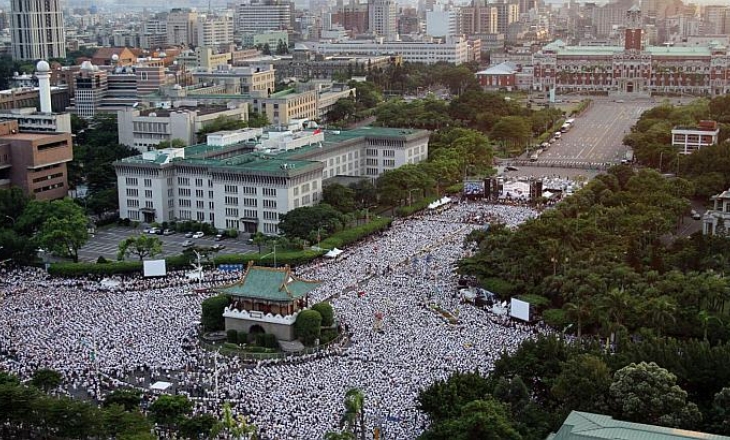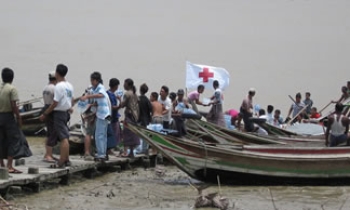The International Federation of Journalists (IFJ) and its affiliate Association of Taiwan Journalists (ATJ) have condemned the restraining of media reporting on a student-led demonstration in Taiwan which led to a violent confrontation between police and protestors earlier this week. This week, the ATJ issued a declaration on the infringement of coverage with calls for police education in the wake of the heavy-handed police response.
Beginning late Sunday evening, March 23, 2014, the National Police Administration (NPA) was called in by Premier Jiang Yi-huah to clear thousands of demonstrators that had occupied Taiwan's Cabinet complex, the Executive Yuan, in an extension of the ongoing occupation of Taiwan's national parliament, Legislative Yuan, which students and citizens have occupied since March 18 to resist passage of a bitterly controversial "Cross-Strait Service Trade Agreement" (CSSTA) with China.
The ATJ said: "The NPA mobilised over 5,000 police and water cannon riot cars and launched a multipronged assault on protestors gathered around the Executive Yuan complex at 12:20am on March 24 and riot police using water cannon directly on the bodies of students completed the 'clearing' of the complex by 5:20am and proceeded to expel citizens from the streets in front of the Executive Yuan by 7am."
"Before riot police moved to clear demonstrators to the north of the Executive Yuan, many photojournalists and other reporters were pushed away from the area. During the process of the 'cleaning' of the complex, numerous incidents of conflict occurred between police and photojournalists."
One journalist was physically carried out by police even though she displayed her credentials as a reporter accredited to cover the Cabinet and another was blocked by riot police who repeatedly raised their shields to prevent her photographing opposition Democratic Progressive Party politicians arriving to participate in the sit-in. Another photojournalist was photographed, held by his neck with clubs wielded by three riot policemen.
The Taipei City Department of Health advised Apple Daily that 123 people were sent to emergency care, including 57 students and citizens, two reporters and one legislator as well as 63 police officers. The ATJ said over 60 people were arrested in the most severe incident of mass violence since November 2008, when thousands of citizens rioted after police attempted to suppress protests over the visit to Taipei by Chinese envoy Chen Yunlin, the then-chairman of Beijing's Association for Relations Across the Taiwan Strait.
The ATJ called on Taiwan's police to uphold news freedom and ensure the right of journalists to engage in news coverage. It also said police must not repeat the practices adopted at the sites of civic resistance in the cases of Wen Lin Yuan, Dapu and the Huakuang Community during which reporters were obstructed from carrying out news coverage or even subjected to violence.
At a news conference on March 24 at the Taiwan Solidarity Union headquarters about the injuries inflicted by police on TSU Legislator Chou Li-nan earlier that day, NPA Deputy Director Tsai Chun-chang publicly confirmed that the police had attempted to expel reporters from the field of police action by saying that "before we carried out the clearing, we asked media friends to leave to the side to separate them for their news coverage work and so I do not understand why there were reporters mixed in with the protestors."
The IFJ said: "This is a deeply concerning situation for journalists in Taiwan. It is unacceptable for police to physically restrict reporting in this way. It was also an extreme overuse of force on the media which was attempting to cover a story of significant public interest. This is a dangerous precedent and the IFJ strongly urges the Taiwanese authorities to allow all media personnel to safely exercise their professional duties in the future."










